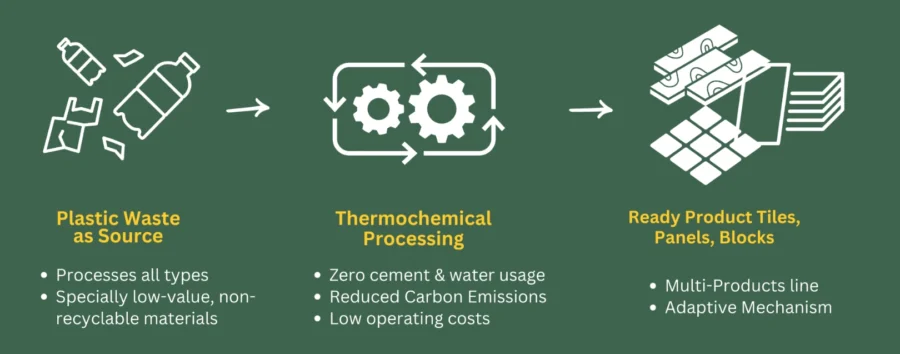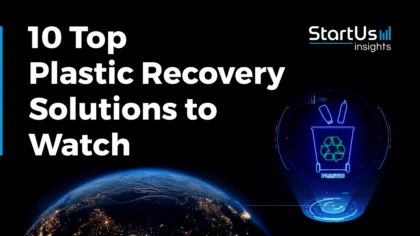Plastic recovery solutions are addressing the global plastic waste crisis. It reduces material pollution, conserves resources, and supports a circular economy. Current technologies include chemical recycling, mechanical recycling enhanced by AI, biological degradation, and solvent-based methods.
These innovations tackle contamination, economic viability, and single-use plastics by improving sorting efficiency and reducing costs. They also minimize waste from landfills, conserve resources, and lower emissions.
Global Startup Heat Map highlights 440+ Plastic Recovery Startups to Watch
Through the Big Data & Artificial Intelligence (AI)-powered StartUs Insights Discovery Platform, covering over 5M+ startups, 20K+ technology trends plus 150M+ patents, news articles & market reports, we identified 440+ plastic recovery startups.
The Global Startup Heat Map below highlights the plastic recovery startups you should watch in 2025 as well as the geo-distribution of the plastic recovery startups & scaleups we analyzed for this research.
According to our data, we observe high startup activity in London, New York City, Singapore, Dubai, and Los Angeles.

Meet Emerging Plastic Recovery Startups to Watch in 2025
We hand-picked startups to showcase in this report by filtering for their technology, founding year, location, funding, and other metrics.
These 10 plastic recovery companies work on solutions ranging from waste management and plastic waste tracking to recycled construction material management to plastic-degrading enzymes.
- MacroCycle Technologies – PET and Polyester Resins
- ESTER Biotech – Plastic-degrading Enzymes
- Universal Plastic – AI-Powered & Blockchain Security Plastic Collection
- Alkyl Recycling – Energy-Efficient Recycling Process
- eBusaka – Waste Management App
- Rezbin – Plastic Waste Tracking
- Stabilogreen – Thermoplastic Waste Ground Stabilization Mattresses
- EcoBricks – Recycled Construction Materials
- Sisa Associates – Collective Design and Manufacturing Platform
- Eco Carbon – Plastic to Carbon-based Materials
1. MacroCycle Technologies
- Founding Year: 2023
- Location: Cambridge, Massachusetts, United States
- Use For: PET and Polyester Resins
- Funding: MacroCycle raises USD 6.5 million for cleaner recycled plastic
MacroCycle Technologies upcycles end-of-life plastics, such as PET bottles, food trays, and polyester textiles, to create virgin-grade MacroCycle-PET (mPET) resin. It breaks down waste plastics into their molecular components and reconstructs them into high-purity resins, maintaining the quality of fossil-fuel-derived PET.
The startup eliminates carbon emissions and reduces its environmental impact by using a low-energy, closed-loop technology. Its technology maintains the integrity of PET, unlike traditional mechanical recycling, making it suitable for high-performance applications in consumer products, packaging, and textiles.
MacroCycle Technologies reduces reliance on virgin petrochemicals and diverts trash from landfills to support global efforts to advance a circular economy and mitigate plastic pollution.
2. ESTER Biotech
- Founding Year: 2025
- Location: Leipzig, Germany
- Use For: Plastic-Degrading Enzymes
ESTER Biotech optimizes plastic-degrading enzymes for industrial applications by creating high-throughput measuring techniques. Its automated plastic degradation screening tool evaluates the breakdown efficiency of polyester-based polymers, such as PET, PLA, PBS, PBAT, and TPS. It uses impedance spectroscopy to track enzyme activity in real time.
The startup improves enzyme performance and makes biological recycling more effective by creating microbial biocatalysts that degrade complex plastic polymers into their monomeric building blocks. Additionally, it develops new processes for pre-treating plastic waste, increasing substrate accessibility, and accelerating enzymatic breakdown.
Its enzymatic hydrolysis method uses less energy and does not produce secondary pollutants as it works in milder conditions than conventional chemical or mechanical recycling. The startup offers solutions for industries to incorporate circular economy principles and reduce reliance on polymers derived from fossil fuels by increasing enzyme-driven plastic breakdown.
3. Universal Plastic
- Founding Year: 2023
- Location: Barcelona, Spain
- Use For: AI-Powered & Blockchain Security Plastic Collection
Universal Plastic develops an AI-powered and blockchain-secured platform that facilitates verified plastic waste collection while promoting ocean regeneration. Its Web3 application supports a network of locally driven environmental initiatives by allowing users, known as Ocean Defenders, to record and disseminate their plastic recovery activities.
The platform includes a digital measuring, reporting, and verification (dMRV) system that evaluates collected garbage in real time using AI to ensure data quality and accountability. These reports are verified by blockchain technology to create Ocean Notarized Digital Assets (ONDAs), which offer transparent, tamper-proof records of plastic collection activities.
This system is beneficial for companies looking to improve their environmental and social governance (ESG) efforts to verify sustainability claims, monitor waste recovery contributions, and adhere to government regulations.
4. Alkyl Recycling
- Founding Year: 2022
- Location: Geleen, Netherlands
- Use For: Energy-efficient Recycling Process
Alkyl Recycling has created an energy-efficient method for recycling disposable diapers and other absorbent hygiene items. Its method breaks down old diapers into their component materials, which include superabsorbent polymers, pure cellulose fibers, and premium plastics.
This process utilises sterilization methods to ensure that the recovered materials meet strict health and safety standards by getting rid of pathogens and medicinal residues. The startup reduces greenhouse gas emissions and environmental impact by avoiding energy-intensive processes like incineration.
The recovered components are applicable to various new uses. The superabsorbent polymers are used in the production of cement and other industrial products. The recycled plastics are used to make a variety of plastic products, and purified cellulose is used to make paper and textiles.
Alkyl Recycling tackles the problem of diaper waste by turning it into useful resources and advancing a circular economy with this sustainable method.
5. eBusaka
- Founding Year: 2023
- Location: Lusaka, Zambia
- Use For: waste management app
eBusaka creates a digital trash management platform that improves the effectiveness and transparency of recycling and waste collection. It connects households, companies, garbage collectors, and municipal councils with its cloud-based technology, which streamlines the network and maximizes resource recovery and waste disposal.
It allows users to plan waste pickups, monitor the status of collections, and get automated reports that offer real-time insights into waste management operations via its web and mobile applications. The platform uses digital monitoring tools to confirm data gathering, ensure accountability, and enable easy online payments for waste management services.
eBusaka incorporates data-driven insights to enhance sustainability tracking, operational efficiency, and revenue management. It lowers administrative inefficiencies and provides stakeholders the ability to actively engage in the circular economy by facilitating digital transactions and transparent reporting.
The startup’s system also includes plastic credit schemes that enable companies to support verified collection and recycling efforts, thereby offsetting their plastic waste footprint.
Want to Explore 440+ Plastic Recovery Startups & Scaleups?
6. Rezbin
- Founding Year: 2023
- Location: Iloilo, Philippines
- Use For: Plastic Waste Tracking
- Funding: Received USD 10 000 Research Fund
Rezbin offers a digital platform for trash management that makes plastic recovery more efficient. It allows users to track their plastic donations and earn reward points, encouraging proactive participation in recycling and waste segregation initiatives through its app.
The platform solves the data and accountability gaps in conventional waste management systems by providing real-time tracking and traceability. The startup ensures accessibility and convenience by placing recovery bins in workplaces, hotels, and schools, turning them into convenient drop-off points.
Rezbin encourages companies and customers to adopt sustainable habits to cut down on plastic waste and save the environment by offering customized incentives and collaborations.
7. Stabilogreen
- Founding Year: 2022
- Location: Liege, Belgium
- Use For: Thermoplastic Waste Ground Stabilization Mattresses
Stabilogreen creates ground stabilization mattresses using an upcycling technique that turns thermoplastic waste into long-lasting and eco-friendly building materials. Its technology recycles all kinds of plastic waste into solid, flexible, and incompressible stabilizing mattresses that are several meters long, 20 cm high, and 2 meters wide.

These mattresses provide optimal load distribution, absorb shocks and vibrations, facilitate hydraulic drainage, and offer efficient thermal insulation. Stabilogreen’s solution replaces or minimizes the usage of non-renewable resources, unlike conventional stabilizing techniques that rely on raw materials like sand and crushed stone.
The stabilization mattresses support a wide range of applications in civil engineering, construction, transport infrastructure, and landscape architecture. It offers solutions for road sub-bases, bridge yoke junctions, industrial building foundations, and soil stabilization under roads, railways, and riverbanks.
The startup addresses the global plastic pollution challenge and the need for high-performance, sustainable materials in the building industry by incorporating plastic waste into structural applications.
8. EcoBricks
- Founding Year: 2023
- Location: Islamabad, Pakistan
- Use For: Recycled Construction Materials
EcoBricks creates sustainable building materials by turning non-recyclable plastic waste into long-lasting and cost-effective building materials. Its production method collects and turns plastic waste into environmentally friendly products like bricks, pavers, and tiles.

The startup uses a compression-based molding technology to ensure that its products are strong, long-lasting, and resistant to weather. This technology makes them appropriate for a variety of landscaping and construction applications. EcoBricks reduce carbon emissions and conserve natural resources, unlike traditional bricks and concrete products that use resource-intensive ingredients like sand and cement.
The startup’s technology offers a scalable and cost-effective housing and urban development option, especially in areas with material shortages. It supports circular economy concepts, encourages sustainable urbanization, and aids in the global drive to reduce plastic waste by combining trash recovery with construction techniques.
9. Sisa Associates
- Founding Year: 2022
- Location: Tokyo, Japan
- Use For: Collective Design and Manufacturing Platform
Sisa Associates creates a communal design and production platform that converts low-value waste materials into high-value goods. It uses a decentralized network of recycling businesses, designers, and architects for this platform. It collects waste such as cigarette butts, old masks, diapers, low-value plastics, and coffee grounds to repurpose them into wall tiles, furniture, and architectural accents.
The startup blends sustainability and craftsmanship by working with nearby recycling facilities and design experts to ensure that garbage is converted into refined and structurally sound items. It uses local knowledge of material recovery and artisanal production to create its collection.
10. Eco Carbon
- Founding Year: 2022
- Location: Bala Cynwyd, Pennsylvania, United States
- Use For: Plastic to Carbon-based Materials
Eco Carbon develops high-value carbon-based products. The startup uses a patented technology to convert post-consumer plastic waste, particularly expanded polystyrene (EPS), into valuable materials. This technique reprocesses EPS to create synthetic graphite, activated carbon, and carbon molecular sieves.
This activated carbon has a BET specific surface area of more than 2000 m2/g. The carbon molecular sieves offer better performance at a cost-effective price with pore diameters under 10 angstroms. It indicates high purity by the synthetic graphite’s surface area of 4-5 m2/g and typical d-spacing of 0.33 nanometers.
Eco Carbon solves environmental issues and provides advanced materials for sectors like energy storage, gas generation, and water purification by turning waste plastic into useful carbon products.
Discover All Emerging Plastic Recovery Startups
This overview highlights just a few plastic recovery solutions from 440+ new companies currently covered by the Discovery Platform. To explore them all, book a personalized demo or download one of our free Industry Innovation Reports for a quick overview.



![Explore the Top 10 Circular Economy Trends & Innovations [2025]](https://www.startus-insights.com/wp-content/uploads/2025/03/Circular-Economy-Trends-SharedImg-StartUs-Insights-noresize-420x236.webp)






